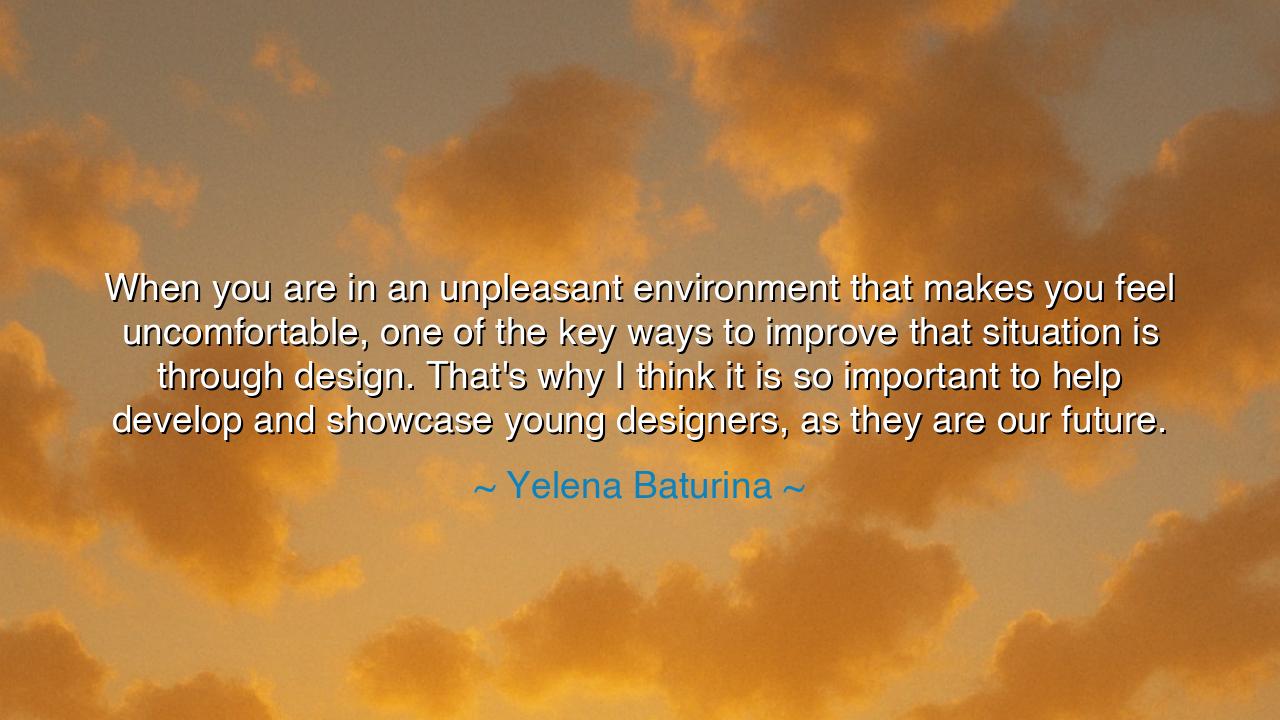
When you are in an unpleasant environment that makes you feel
When you are in an unpleasant environment that makes you feel uncomfortable, one of the key ways to improve that situation is through design. That's why I think it is so important to help develop and showcase young designers, as they are our future.






“When you are in an unpleasant environment that makes you feel uncomfortable, one of the key ways to improve that situation is through design. That's why I think it is so important to help develop and showcase young designers, as they are our future.” Thus spoke Yelena Baturina, a woman who built both empires and visions, who saw in design not vanity but salvation—a way to heal the wounds of the world through the careful shaping of space, form, and thought. Her words are not mere praise of art or architecture; they are a declaration of faith in creation as transformation. She reminds us that through design, the human spirit may reclaim beauty from despair, order from chaos, and meaning from the void.
For what is design, if not the art of harmony? It is the eternal dialogue between humanity and its surroundings, the bridge between soul and structure. From the cradle of civilization, when our ancestors carved dwellings into the rock or painted walls with ochre and fire, design has been humanity’s answer to discomfort. Where there was darkness, we shaped light; where there was harshness, we made comfort; where there was emptiness, we built meaning. Baturina’s insight speaks to this ancient impulse—the understanding that when the world feels cruel or cold, the act of designing is an act of hope.
Consider the city of Florence, which once lay ravaged by plague and poverty, its people burdened by despair. Yet from its ashes rose the Renaissance, born not of conquest but of design—of architects like Filippo Brunelleschi, who dared to raise the dome of Santa Maria del Fiore, a miracle of geometry and faith. His work did more than crown a cathedral; it restored the confidence of an entire people. The city, once shadowed by death, found renewal in beauty. Such is the power of design—it is creation against decay, a triumph of imagination over circumstance.
Baturina’s call to support young designers is more than philanthropy—it is prophecy. For the world’s renewal depends on the creativity of those who dare to envision a better reality. The youth who sketch, build, and craft today are the stewards of tomorrow’s harmony. If they are nurtured, our cities will breathe; if they are silenced, our world will wither beneath the weight of repetition and neglect. The future, she reminds us, belongs not to those who accept their environment, but to those who redesign it with courage and care.
Yet her words hold another truth: that design is not limited to buildings or objects. It is the shaping of experience, of community, of life itself. When we find ourselves in unpleasant surroundings—whether a gray office, a fractured relationship, or a broken society—the instinct to redesign is divine. To rearrange, to rebuild, to beautify—these are not trivial acts. They are declarations that discomfort shall not have the final word. Every human being, in their own sphere, can be a designer of change, crafting better spaces for the soul to dwell.
The lesson of Yelena Baturina is therefore clear: when the world feels harsh, do not flee from it—redesign it. Do not curse the ugliness that surrounds you; instead, cultivate beauty where you stand. Support those whose minds are aflame with new visions, for they are the architects of our shared destiny. A young designer’s sketch may one day become the school that nurtures a mind, the park that shelters a heart, or the city that inspires a nation.
So, children of tomorrow, take this wisdom into your hands: see every discomfort as an invitation to create. When you enter a room that feels oppressive, imagine how it might breathe with light. When you witness despair in the hearts of others, think how your actions might redesign their hope. For in shaping your world with intention, you shape your very soul. The future is not built by those who endure the world as it is, but by those who design it anew.
And thus, in the spirit of Yelena Baturina’s vision, let it be said: the truest power of humanity is not in what we destroy, but in what we design. For every great age—whether of stone, bronze, or silicon—has risen not through might, but through the quiet, persistent art of those who dared to make the unpleasant beautiful, and the imperfect whole.






AAdministratorAdministrator
Welcome, honored guests. Please leave a comment, we will respond soon